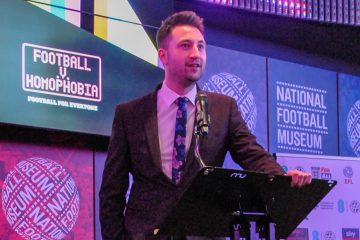Rainbow Wall flying flag for Wales and LGBTQ+ fans as Euro 2020 begins in Pride Month

Having seen their side reach the semi-finals at Euro 2016, hopes are high in Wales ahead of this year’s European Championship – and cheering the players on will be the national team’s new supporters group for LGBTQ+ fans and allies. Carys Ingram gives us the lowdown on ‘The Rainbow Wall’…
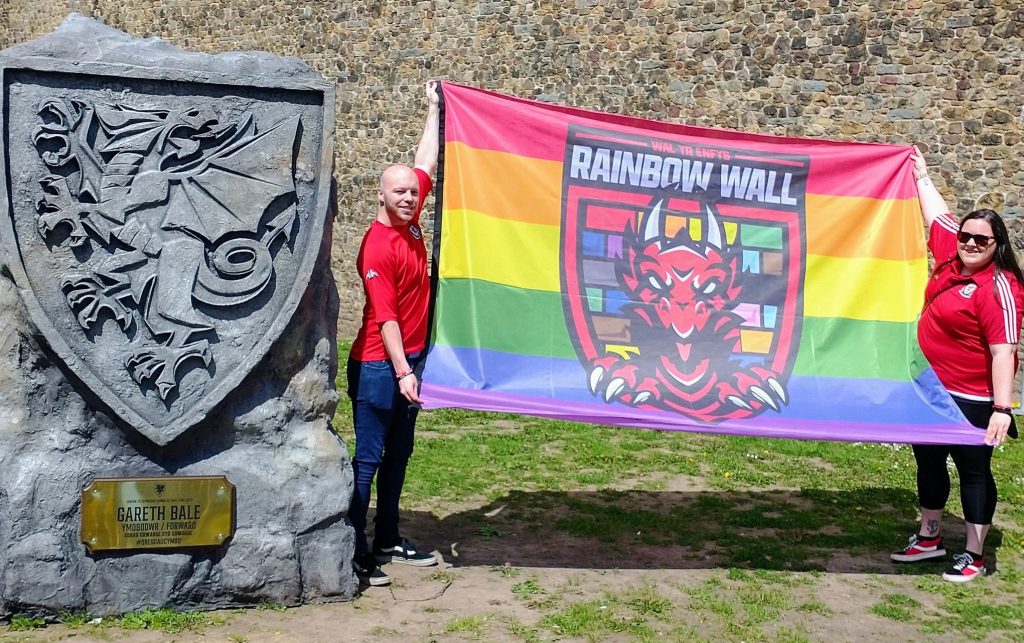
With the Red Dragon proudly guarding a multi-coloured brickwork backdrop on a giant Pride flag, there’s no missing the new banner of ‘The Rainbow Wall’.
The fans group has only been going a few months but with the full backing of the Football Association of Wales, it’s already proving to be a big success. Visibility is growing across the country and in the media – and it’s not just because of that eye-catching flag.
Now, with the team preparing for their big kick-off at Euro 2020 as they take on Switzerland in Saturday’s Group A opener in Baku, attentions are turning to the important business of the summer tournament.
But before all that, Sports Media LGBT+ wanted to learn more about the network’s origins and the wider inclusion work being done by the FAW and Wales fans, both around the national team but also with their clubs.
Thankfully, co-chair Carys Ingram – who also runs Swansea City’s LGBTQ+ fans group, Proud Swans – was on hand to answer all our questions! Here we go with our latest Q&A…
JH: Hi Carys! It’s so great to see The Rainbow Wall enjoying such a strong start. Tell us more about the group and how you got involved...

CI: The Rainbow Wall [TRW] was initially discussed at the end of 2020 with the FA Wales and was launched on Twitter in February 2021. Our first major event as an official Supporters Group was ‘The Big Social’ – we took part in a pre-match social alongside our Belgian counterparts on Zoom before the Belgium vs Wales match back in March. We played a quiz, broke up into smaller groups to discuss the upcoming game, and finally sang our national anthems loudly and proudly to each other over our Zoom windows! It was a fantastic way to launch TRW.
I got involved with the group after talking with Jason Webber, the FAW’s Equality, Diversity, Inclusion and Integration Manager. Jason had done a lot of work alongside volunteers and supporters to get TRW up and running. I initially wanted to chat with him about what the FAW was doing with inclusivity at a national level and he told me about TRW, its values, the aims for the group, and future projects already in the pipeline. After that chat, I felt it was only right to join the group and do my part to help make the Cardiff City Stadium and international matchdays as friendly and inclusive as possible moving forward.
After joining TRW, I took over the main social media role, tweeting out about our projects and matchdays, reviews of what Welsh players and teams had done over the past week, and other things. I also helped the guys to establish a constitution, banking, and roles. I am now TRW co-chair, alongside Brandon Gregory. We felt it was important to have two co-chairs to not only share the workload but to give us perspective from two different genders as to what we should be doing going forward.
As a group, we encourage bringing on as many members of the team as possible and adding them to the typical roles (treasurer, secretary, social media manager, etc) as we’re all only volunteers. Having more members on board can really help the group evolve and bring on more opinions of what we can be doing to make Wales more inclusive. TRW itself is an LGBTQ+ supporters group, but it’s not just for LGBTQ+ members of the community. We highly encourage allies to step forward and help us spread our message of inclusion, help us with our projects, and project our values through the Red Wall and communities.
We aim to firstly make Wales matchdays more inclusive for not just Wales fans but for any international supporter who may be visiting the stadium, and make sure Wales supporters feel safe going away to watch our teams play, in countries that may not be as welcoming about LGBTQ+ people.
Eventually, we want to be able to work alongside the LGBTQ+ club supporters groups already established to help them create inclusive matchdays, and move these values and aims all the way through the Welsh system and into grassroots football.
The new flag looks brilliant! Will it be in stadiums when Wales play at the Euros? Why is this visibility important?
Thank you! We think it’s really important to use things such as flags as a symbol. Not everyone will see a flag and automatically feel safer and welcomed in places, but for a lot of the LGBTQ+ community, a symbol such as a rainbow flag, trans flag, or even one of the players wearing a rainbow armband as we saw recently, can make people feel a lot safer knowing that they’re accepted and welcomed in that place.
As for placing the flag in stadiums at the Euros, it’s certainly something we’re asking the FAW and our members about. However in places such as Baku, the LGBTQ+ community is not welcomed, so we do have to be careful in other countries in regards to being out and proud.
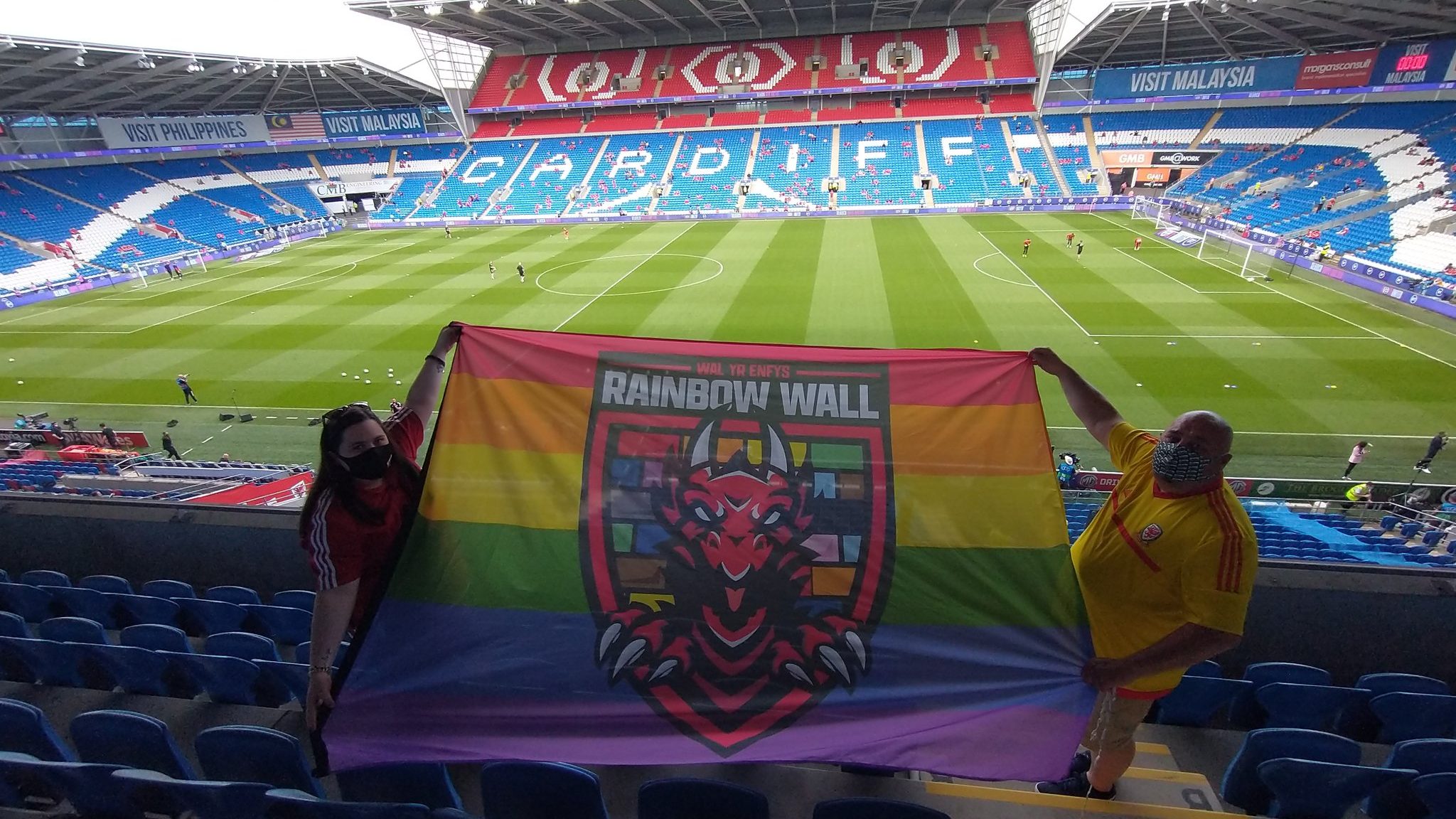
Those who watch Wales games regularly may have seen the red dragon and trans colours flag. Could you tell us about that particular flag, its history, and how long it’s been going?
Hopefully, your readers will already know about the Trans Pride flag with its light blue, pink and white stripes – it was created by an American trans woman, Monica Helms, in 1999, as it was seen that the regular six-colour rainbow flag that we all associate with the LGBTQ+ community didn’t actually represent the trans community so they created their own flag to identify with. The colours have now been incorporated into the Pride Progress flag too.
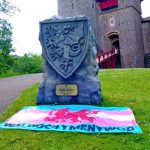
As for the Wales flag, the best person to ask is its original owner, Penny Miles, about why she created the flag. So I did just that! Here’s Penny…
“The flag bears the name of Wal Goch y Menwyod, which was set up as a fan group to support the women’s national team. That fanbase is in its infancy – we essentially have a blank canvas to work from. In other words, we don’t want to retro-fit a Black supporters group, an Asian fan group, and an LGBTQ+ or disability supporters group, but rather try and start to include everyone across the spectrum from the outset.
“Wales is not a big country, so neither is the fanbase. The reason for the trans flag is slightly personal – I have a number of trans friends, and I have done research on trans lives such as in Chile and with older trans people in the UK. I’m aware of the huge backlash towards trans people in the UK presently, so it was a statement to say that you are welcome in Welsh national football.
“We got it, half sponsored by Football v Homophobia (I’ve been working with Lou Englefield to try and move forward on LGBTQ+ inclusion in Welsh football fan spheres), for matches during the pandemic when games were played behind closed doors. It was to both support the players, but to also tell trans fans that they are welcome. It also reflects the activism of players such as Jess Fishlock and Tash Harding.
“The trans flag was the second of two flags that we got to support the women’s team. I’d originally set out to get the Pride Progress flag due to the need to be intersectional – but once I saw the dragon on the trans flag, it had to be that.
“Mr Flag sent potential designs over – and visually it was just right – but as it aligns with current struggles, it was also right for those reasons, so there was perhaps also an element of fate. This is all in the context of my research on gender relations in Welsh football, which started from personal experiences of being questioned in terms of my participation as a fan of the men’s game. I didn’t want that to happen for fans of the women’s game, but to start differently and to start better.” (Thanks so much to Penny for this info! JH)
Carys, how do you assess the work that the FA Wales has been doing around LGBTQ+ inclusion? What does the future look like?
I don’t think you can fault the work of the FAW when it comes to inclusivity. It’s certainly something they post about on their social media accounts, whether that be raising awareness about tackling sexism, racism, or homophobia. I think football is far behind other sports when it comes to understanding and discussing topics about the LGBTQ+ community because we are underrepresented in the sport, especially in the men’s game.
I think the FAW are doing the best they can as an organisation and it’s up to us as volunteers and community members of TRW to help them in areas they may not understand. We can all help to make positive change.
What’s the situation with the club fans groups – what role will they play? Proud Swans seems to be really energised at the moment, plus there’s lots going on at Wrexham, and we’ve seen groups are starting up now at Cardiff and Newport too…
Yes, more fan groups are really popping up now! It’s so great to see so many people taking the initiative to create a social media presence, and build a presence within their clubs and at the stadiums to make sure the LGBTQ+ community across Wales feels safe and included in the football community.
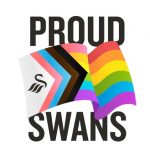
As you pointed out, Proud Swans and the Proud Dragons (Wrexham) are doing some fantastic work now to combat discrimination surrounding their clubs and we’re now seeing Newport and Cardiff both creating LGBTQ+ supporters groups as well.
I think it’s really important to have supporters being at the forefront of making change at a football stadium and with clubs. Football clubs can become a business and the people at the top can just start to deal with the money/people/players coming in and the outgoings throughout the year, but fans are people on the ground, they’re the people who’ll always be with the club, the people who experience the most with the club and I think it’s important that the fan groups such as LGBTQ+ inclusion groups, trust groups, groups to combat racism/sexism and disabled supporters groups really get stuck in to shape a better future for their football club and the supporters who follow.
I recently wrote about Harri at Cardiff Dragons and how inclusive clubs help to get LGBTQ+ people active. Is that something the Rainbow Wall is looking to help with too?
Yes is the short answer! It’s statistically shown that only around 45% of LGBTQ+ men are active, compared to 67% of heterosexual men, while only 44% of LGBTQ+ women are active compared to 55% of heterosexual women. For those who identify as non-binary/transgender, only around 36% would say they are active.
As we know, being active releases endorphins and helps in the long term, not just physically but mentally. The LGBTQ+ community are twice as likely to suffer from long-term mental health conditions due to the discrimination shown to them throughout their life, but if we could counter act those negative emotions with positivity through sport, also helping their mental and physical health, then I see no downside to that.
How important are role models like Jess Fishlock and Tash Harding?
It’s extremely important to have people such as Jess and Natasha to represent the community. They’re in a unique position that a lot of people don’t ever get the chance to find themselves in – they’re influential, their voices can be heard, and they can make a real difference. For the youth – not just girls but boys, non-binary, and trans kids – to see someone who’s like them, on a world stage, it just validates how they feel and who they are, and it makes them realise that they too can do anything they want to, no matter their gender identity or sexual orientation.
Jess and Natasha have done a fantastic job, along with many other players, staff, coaches, and media representatives to bring LGBTQ+ issues to light and help the community within football.
It was another disappointing end to the campaign for the Swans as you lost in the Championship play-off final for the second consecutive season. How are you all feeling as you look ahead to 2021/22? Is top two the dream?
I think most fans will agree that they didn’t see us even getting ourselves into the position we finished in (fourth), at the start of the season.

I think with the squad we’ve had the past few seasons, the loans, lack of spending, players sold and bringing in Steve Cooper who hasn’t had a lot of experience in the EFL, we have overachieved. Next season, I think we’d all be happy to just stay in the top half of the table, as it’s set to be a summer of change inside Swansea City, with big players leaving, loan spells ending, and Cooper being linked to jobs in the Premier League.
I think we can only hope that whoever is in charge next season, whichever players we have, that they just do their best and give their all for the club and fans.
What are your hopes for the Euros? Who are the ones to watch for Wales? Where will you watch the games, if not in Baku or Rome? (After facing the Swiss and then Turkey in Group A, Robert Page and his players travel to Italy to take on the Azzurri in the Stadio Olimpico)
After 2016, I think the whole of Wales believes that anything can happen when we start the tournament. The excitement and buzz leading up to the Euros is just so refreshing after the year everyone has had.
Unfortunately, I’ll be watching the Euros at home and in the pubs – much like a lot of the Red Wall – due to travel restrictions and Covid still being a big threat, but that doesn’t dull the excitement at all.
Most teams will be looking at our attacking threats going into the tournament as the main people to watch out for but I think goalkeeper Danny Ward could be a possible dark horse going into the tournament, and that defensive line we’ve got – from Joe Rodon, Ben Cabango, Connor Roberts, Chris Mepham, Neco Williams, and Ben Davies – is solid.
Opposition teams need to worry maybe about how strong our defensive ability could be, rather than our attacking threat. The hopeful fan in me sees us getting out of the group and getting to the quarter-finals.
And finally, what is the Rainbow Wall / Proud Swans message for Pride? How can people get involved, in either group?
Firstly, HAPPY PRIDE EVERYONE! Be true, be you, be proud!
This Pride, I think as much as we all like to party, wear our colours, and celebrate being different, we also have to take time to reflect on how we have got to this point and what we have to do in order to keep progressing forward and making not just football but our communities a more equal, safe place to live for members of the LGBTQ+ community.
If you’re someone who doesn’t know a lot about the LGBTQ+ community, its struggles, its ongoing fight for equality, then I would say just to read up, find out what volunteers from the community are doing to make a real change, and just become more educated and support people in this movement.
At the end of the day, everyone involved with Proud Swans, The Rainbow Wall, Proud Dragons and beyond are all football fans first and foremost. We’re all there to watch the game we love, supporting the teams we love, and we all have that in common – no matter our race, religion, sex, gender, or physical ability.
We need to come together to make our sport inclusive and not exclusive. We need to make change, and as fans, we need to be at the forefront of holding people accountable for their online abuse of these minority groups. Be Kind!
Our thanks to Carys, and good luck to Wales at the Euros!
For more information on The Rainbow Wall, follow on Twitter and Instagram and sign up to become a member here.
You can find Proud Swans on Twitter, Facebook and Instagram at @proudswans and you can join them by signing up here.
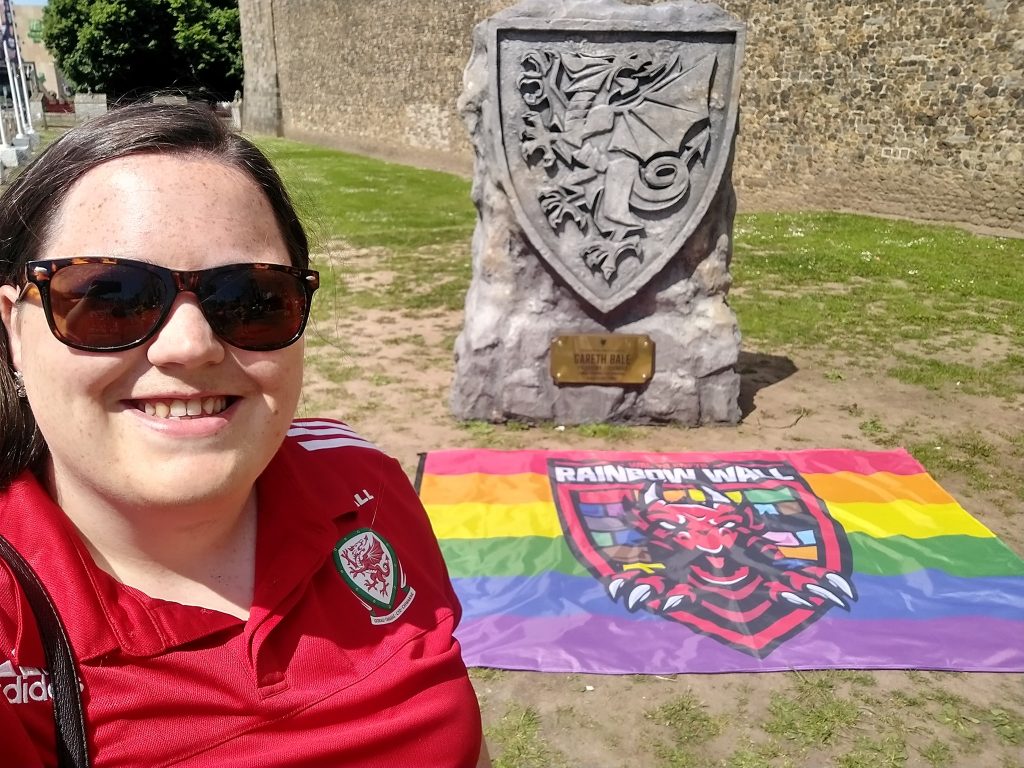
Sports Media LGBT+ is a network, advocacy, and consultancy group that is helping to build a community of LGBT+ people and allies in sport. We’re also a digital publisher. Learn more about us here.
LGBT+ in sports? Your visibility will inspire other people – sharing your story can be hugely rewarding and you don’t have to be famous to make a positive and lasting impact. We encourage you to start a conversation with us, in confidence, and we’ll provide the best advice on navigating the media as part of your journey so that you retain control of your own narrative.
Email jon@sportsmedialgbt.com or send a message anonymously on our Curious Cat.
